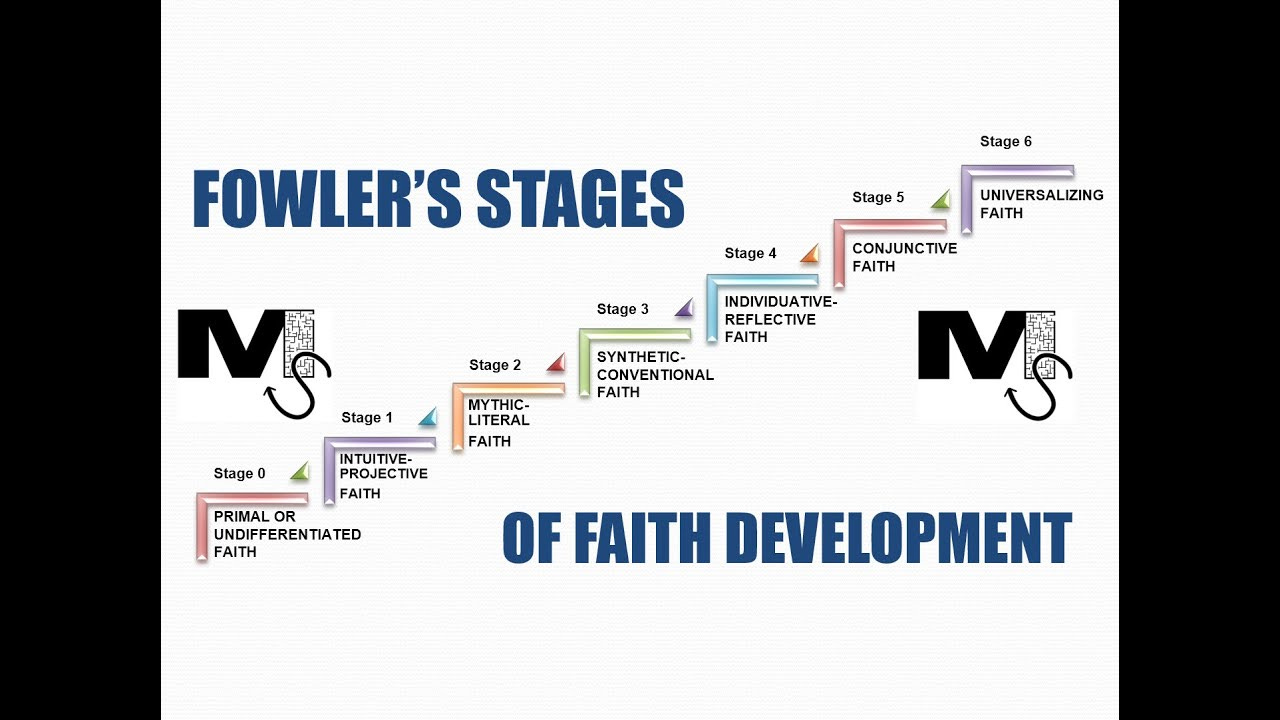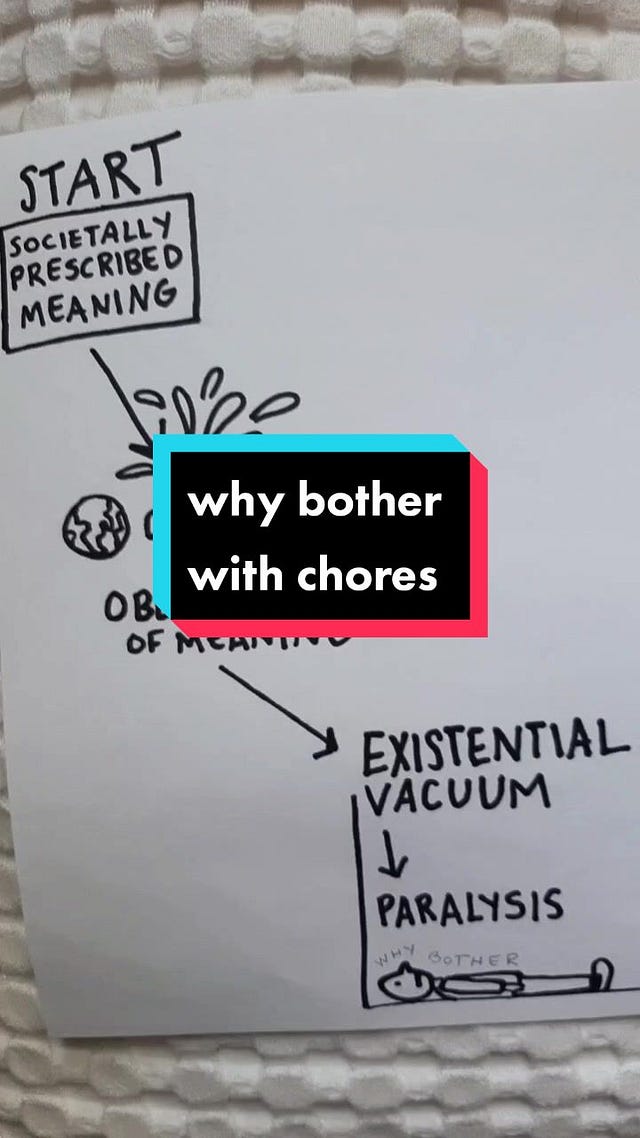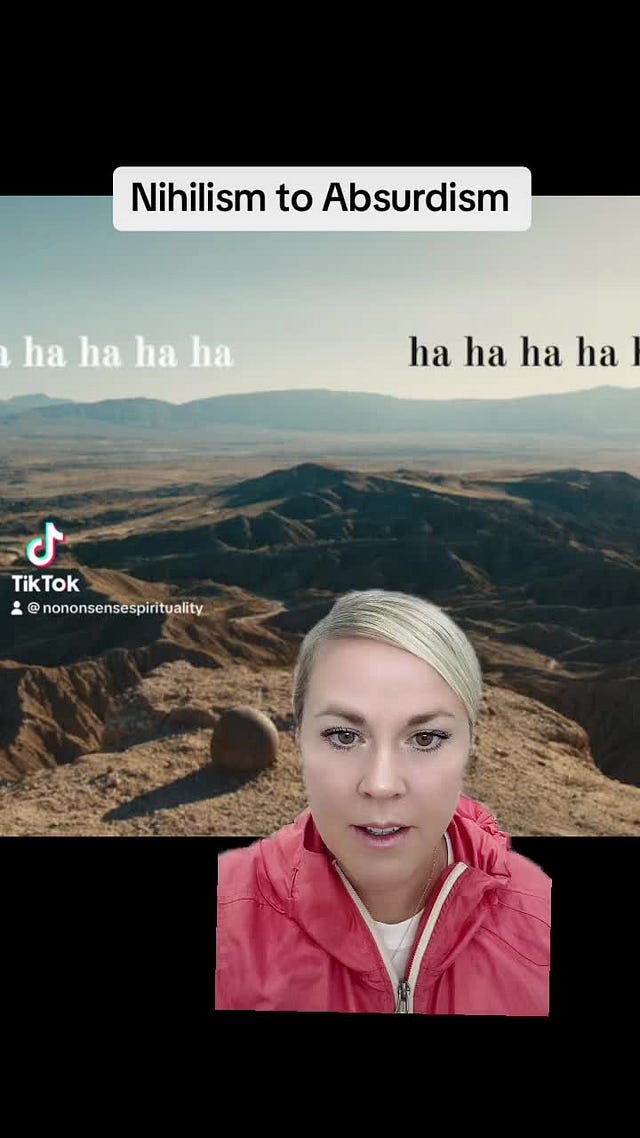The Nihilist's Survival Guide: 4 Walking Sticks for Trekking Across the Void
On forging purpose after losing purpose.
One quick important announcement before we deep dive into the void.
Next Sunday (February 11) is the very first meeting of Reconstruction Community, which you can read all about here in great detail.
One thing I forgot to write in that post is that I will send out the recorded replay of each session to all members! Come join us next Sunday, our theme is: GET OUT OF MY HEAD OLD MAN: Deconstructing and reconstructing God.
Sign up with this button here and you will get the zoom link for our first meeting in your inbox:
Ok, onto the void.
“The thought of life having no meaning terrifies me.”
“I just never thought I would be here. I thought the church had some issues but I would never ever leave. Then I left, but didn’t think I would leave God or Jesus. Then I did, but didn’t think I would leave purpose. Now I’m staring into the pit of nothing meaning anything. It’s like my past self’s worst nightmare has come true.”
“I listened to Brit Hartley’s Mormon Stories and honestly it freaked me the f*ck out. I’m so scared of falling into nihilism.”
“I miss the knowing. I wish I had that clarity again.”
Nihilism, or the idea that life has no meaning, is one of the most common topics brought up when I meet with spiritual direction clients. I was just flipping through my notebook to write this article and these quotes are things I jotted down from sessions I’ve had this month.
Purposelessness is new for those of us who grew up in a religion that wrapped up our purpose in a pretty pink bow and placed it on our doorstep. We have no experience living life without it. We’ve always known where we come from, why we’re here and where we’re going.
And now we don’t.
New is scary.
Frameworks make new things less scary. I find myself often repeating the concepts that have been helpful to me in my own void, wishing they were all compiled in a nice little list somewhere with some visuals…..
Come. Let us travel into the void.
But wait. Before we jump in, there is one thing we must get crystal clear on from the get go:
You’re not doing anything wrong.
For me and the the people I meet with, we’ve had helpful messages like “you’ll be utterly lost without the gospel,” “it’s so tragic when people don’t know their purpose,” and “happy are those who keep the commandments (sad are those who don’t)” syringed into our brains thousands of times in thousands of lessons from a very young age.
So when faced with the natural sadness and loss of purpose that accompanies a faith transition, it’s reasonable to think “Oh. This is all my fault. I’ve done something wrong- my sadness and lack of direction is proof.”
But that is not true.
Do you hear me? IT’S NOT YOUR FAULT. YOU’VE DONE NOTHING WRONG.
In fact, questioning the packaged meaning given us by the systems, countries, institutions, governments and religions that raised us is not only normal, it’s a necessary part of maturing.
In James Fowler’s model of spiritual growth, stage three is full literal belief in what we’ve been taught. This is the stage high demand religion says is the final stage. The ultimate goal is a “fullness of faith” and total obedience in the institution.
But total obedience without questioning or critical thinking only keeps us stuck in immaturity (sorry to disrupt our entire packaged purpose so early in the essay, but we’ve got places to go).
If we want to progress, we must move on to stage 4, which is characterized by critically examining the teachings and practices we’ve been handed. A trademark of this stage is disillusionment. It is difficult but essential to move the moral compass from an external source to an internal one. This is what renowned psychiatrist Carl Jung says is the work of the second half of life.
If we hope to mature, embrace paradox and fully offer the world what we uniquely have to offer- questioning the values, beliefs and priorities we’ve been handed is a requirement. Not a moral failing.
There is no direct flight from order to re-order. You must pass through disorder.
Let’s imagine we are doing our thing, walking along in this little life of ours, when suddenly through no fault of our own, the certainty and purpose with which we’ve always navigated life goes away.
We see ahead of us a pit of meaninglessness and uncertainty. It scares the shit out of us. We think no, no, no, no, no we will not fall in the pit! We will just find a new certainty, a new purpose!
We look at the big scary void and say “no thanks.”
Understandable.
However, I’m going to make a case for embracing the void. Stay with me! When I say “embrace the void” what I’m NOT saying is meaning and purpose is stupid and serves no function or that you’re a real dummy if you need them. Enjoy your new life of relentless cynicism and bitterness where nothing ever matters at all!
Creating meaning and purpose is a necessary thing for our brains. But like Mr. Fowler says up there, when we outsource the meaning and purpose of our existence to the institutions we were born into, we run into problems.
Problems like group think, conformity, lack of critical thinking, guilt, shame, fear, rigidity. To name a few. To get the good stuff from meaning and purpose and to avoid the bad, creating our OWN meaning and purpose is the way to go.
BUT! In order to do that, we must deconstruct the meaning and purposes handed to us. And that often requires a little trip through the void of “what if there is NO inherent meaning or purpose at all?!”
I’m going to tell you what my faith transition advisor told me. (Imagine I’m holding your hand and looking kindly into your eyes as I bear some bad news) There is no direct flight from order to re-order. You simply must pass through disorder. You don’t go from birth to re-birth without passing through death. Death is messy.
Wouldn’t it be nice if we could just have one sense of order and meaning and skip on over to a new one without any grief or anger or hopelessness or disillusionment?
It would be nice, but it is not realistic. Believe me, I tried.
In order to move ourselves from the land where our purpose was handed to us into a land where we create our own, we must journey into the pit of uncertainty where we look the question “what if there is no purpose?” dead in the eye.
Since trekking through the void is new and scary, some walking sticks may be helpful.
I’m going to offer four that I have found grounding and useful. Some will probably resonate with you more than others- pay attention to which ones hit home for you. And then offer your own to the group in the comments!
1. Treat teensy tinesy things as the Big important meanings
One day about three years ago, I had nihilism on the mind. I was talking about it on my Instagram Stories that week, messaging people, listening to their experiences. Later as I was numbing my feelings via Tiktok, I had real “Eureka!” moment as I randomly came across a creator existentializing housework. A visual learner after my own heart, in this video she creates a diagram for emerging from the pit of meaninglessness. It’s perfect.
While her account is about housework, the diagram works perfectly for leaving religion (and incorporates ANY loss of meaning- ie that you must be good or productive or successful or attractive or whatever you were taught your purpose is).
My favorite part is how little the meanings are on her ladder out of the pit of meaninglessness.
We have to acknowledge coming out of a high demand religion just how satisfying it felt to be handed a capital B Big meaning. We knew exactly what it was we were supposed to be doing. Our human brains LOVE that shit. They LIVE for it. (Don’t feel stupid for wanting it to be handed to you- of course we want this.)
It is understandable then that we would seek to replace our Big meaning with another equally all-encompassing Big meaning.
But in our hunt for Big meaning or Big purpose, we can easily overlook the pretty little small meanings curled up at our feet looking up at us with their cute puppy eyes wanting to be petted.
I love how in the first step of her ladder out of the pit that creator wrote “movies.” In our past Big meaning life, movies were quite trivial. Worldly. Unimportant. Not very meaningful. But you don’t get out of the pit of meaninglessness with another Big meaning replacement that comes with all the same defects as our last Big meaning (obligation, close-mindedness, rigidity, fear, allegiance).
You get out by becoming a spark detective. By detecting what sparks a little joy in you, a little hope, a little connection. Noticing those sparks. Savoring them. Injecting them with your own unique flavor of purpose and meaning.
Allowing yourself to savor the satisfaction found in really good movie. Or a really good piece of toast. Make a list of your own little ladder of joyful sparks. Let those mean just as much as…. anything. Everything.
2. All for this
Which segues beautifully into our next framework “all for this.”
Last summer while on day three of a four day road trip with my kids, I was listening to the audiobook The Wisdom of Insecurity by philosopher Alan Watts. His messages go so deep, it was difficult to grasp them all above the background hum of Super Smash Brothers and Taylor Swift emitting from the back of the car, but something he said pulled me under to meet Alan in the depth.
He asked, “What’s it all for? All this history, misery, science, evolution?” And then he said the phrase that has stuck with me ever since… “all for this.”
All for this. Everything leading up to this exact present moment.
I got goosebumps in my car. All for this. This road trip, these big fluffy clouds outlined in pink before the sunset, this car full of my kids playing their Nintendo Switch and listening to their curated Spotify playlists. All for this precise moment listening to Alan Watts on my headphones that never go loud enough.
That phrase just kept coming back to me last summer in random moments that would stop me in my tracks and bring the goosebumps back.
What’s it all for? All for this. This moment walking my son back from summer camp listening to how upset he is about another kid poking fun of his Pokemon expertise. This moment rubbing his back walking along the concrete in my green overalls. All for this.
All for this moment alone reading on my bed looking out my window pausing as I read my romantasy novel appreciating the sunshine and pine trees and the soft feel of my sheets.
All for this.
4. Absurdism (pop on those googly eyes)
If you are interested in the nihilism that can arise after leaving religion, run don’t walk to Brit Hartley’s Mormon Stories episode and follow her.
She has about a million videos on nihilism, but here’s my favorite clip of her discussing her take on embracing the void:
In the movie Everything Everywhere All at Once the daughter meets the void of meaninglessness. Nothing matters. So why not eff things up? She goes full on villain in the movie. Towards the end, her and her mom are rocks staring into the void together. On the verge of hopelessness, the daughter looks over at her mom. And the mom pops on a pair of googly eyes. They laugh and connect and chase each other.
This scene is a masterpiece. It represents the shift that philosopher Albert Camu says is the ticket out of nihilism: absurdism. He said,
“The realization that life is absurd cannot be an end, but only a beginning.”
Systems and structures of power have always tried to instill purpose in their followers. Sometimes this is functional. Sometimes it’s very harmful. But seeing the absurdity of these attempts with a smirk and a wink is a nice ticket out of the dreary kind of “Oh no! There is no purpose!” You’ve been duped, but you’re in on the joke.
Yes, life is a mess and doesn’t have an inherent singular purpose. Our rules are absurd. Life is absurd.
What to do? Stick on some googly eyes and embrace the absurd.
5. Dying before you die: life after purpose.
Living under the belief that there is one specific reason you are here, but first you must discover it, then you must be certain of it, then you must use up all your energy and talent fulfilling your one specific purpose (no pressure!) is a one-way ticket to cloud coo-coo land. Or at least living with a high level of stress.
Author Elizabeth Gilbert (who thinks “finding your purpose” is both over-rated and impossible) has this great story about purpose. One day she was walking along the street in her neighborhood. There was a window washer a couple stories up whose ladder was looking awfully shaky. Unable to walk away, she stood at the bottom of the ladder and held it for 15 minutes. Then she carried on her way.
She thought: What if that act was my whole purpose in life? What if I just fulfilled my entire reason for existence? Check. Done. Having completed my purpose, what if I was now free to live without one? Just free to live.
She decided to live believing that very thing. Her old life worrying what her purpose was and if she was fulfilling it was over. Her new life living just to live began.
Richard Rohr has a similar life/purpose philosophy he calls dying before you die. Imagine you die. You’ve completed whatever it is you were here to do. Your identities? Dead. Your musts and shoulds and purpose? Gone. Now imagine you suddenly come back to life. Here. now. You yourself are alive but your identity and whatever it is you were “supposed to do” in this life is dead. Now. What is it you WANT to do?
Ok, those are some ideas that have helped me in the void. Now you tell me- what ideas/concepts/people have helped you?












On day, a pair a mormon missionaries knocked on my door unaware that I once was a member. They asked, as I too ounce did, what do you think happens after death. I was so happy to say, “I don’t know but I am so excited to one day find out.” The missionary who was probably the senior opened his mouth and then closed it. I continued sharing that there are so many options out there. I disclosed that Inonce was a mormon and knew that option and now I know more options. Rather that being overwhelmed with despair I looked at life with curiosity. The day I find out what is next I will be proud to share that I lived according to my values as I lives what I hoped was a life well lived.
I don’t know why I do what I do. And I don’t have to know. Life is an ongoing mystery, and I don’t have to figure out the details. I just need to find joy in whatever I do. And accept whatever happens. I just came back from a two week visit to Mexico. Wasn’t too sure why I was going to this Reset conference in Morelia. But glad I went, turns out, I like Mexico, and might even move there. I make decisions, not mistakes. I am a work in progress, just like humanity. Am I loving it? Yes.